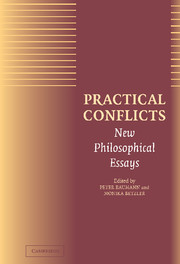Book contents
- Frontmatter
- Contents
- Foreword
- 1 Introduction: Varieties of Practical Conflict and the Scope of Practical Reason
- 2 Willing the Law
- 3 The Myth of Egoism
- 4 Thinking about Conflicts of Desire
- 5 Putting Together Morality and Well-Being
- 6 The Second Worst in Practical Conflict
- 7 Personal Practical Conflicts
- 8 Sources of Practical Conflicts and Reasons for Regret
- 9 Conflicting Values and Conflicting Virtues
- 10 Involvement and Detachment: A Paradox of Practical Reason
- 11 Outcomes of Internal Conflicts in the Sphere of Akrasia and Self-Control
- 12 Are There Insolvable Moral Conflicts?
- 13 Moral Dilemmas of Transitional Justice
- 14 Do Conflicts Make Us Free?
- List of Contributors
- Name Index
- Subject Index
- References
2 - Willing the Law
Published online by Cambridge University Press: 02 December 2009
- Frontmatter
- Contents
- Foreword
- 1 Introduction: Varieties of Practical Conflict and the Scope of Practical Reason
- 2 Willing the Law
- 3 The Myth of Egoism
- 4 Thinking about Conflicts of Desire
- 5 Putting Together Morality and Well-Being
- 6 The Second Worst in Practical Conflict
- 7 Personal Practical Conflicts
- 8 Sources of Practical Conflicts and Reasons for Regret
- 9 Conflicting Values and Conflicting Virtues
- 10 Involvement and Detachment: A Paradox of Practical Reason
- 11 Outcomes of Internal Conflicts in the Sphere of Akrasia and Self-Control
- 12 Are There Insolvable Moral Conflicts?
- 13 Moral Dilemmas of Transitional Justice
- 14 Do Conflicts Make Us Free?
- List of Contributors
- Name Index
- Subject Index
- References
Summary
Kant believes that we must come up against practical conflicts in order to feel the normative force of morality, because that force consists in our own unwillingness to live with practical conflicts of two kinds: contradictions in conception and contradictions in the will. Every instance of immorality is, according to Kant, an instance of one or the other conflict; and only by recognizing and recoiling from these conflicts do we come under the guidance of morality. Because these conflicts are contradictions, they are conflicts of reason, and their instances are irrational as well as immoral. We come under moral guidance, then, in recognizing and recoiling from conflicts of practical reason.
I am going to argue against Kant's account of contradictions in the will, and in favor of an alternative account, which I shall call “concessive.” My arguments will imply that Kant is wrong about one of the ways in which wrongdoing is irrational, and hence about one of the ways in which we are guided by morality.
Kant is committed to the proposition (ⅰ) that wrongdoing entails irrationality in the agent, since a perfectly rational agent always does the right thing. He is also committed to the more specific proposition (ⅱ) that wrongdoing entails irrationality in the action, since the balance of valid reasons for acting always favors doing the right thing. The latter, more specific proposition has often been the target of criticism.
- Type
- Chapter
- Information
- Practical ConflictsNew Philosophical Essays, pp. 27 - 56Publisher: Cambridge University PressPrint publication year: 2004
References
- 2
- Cited by



